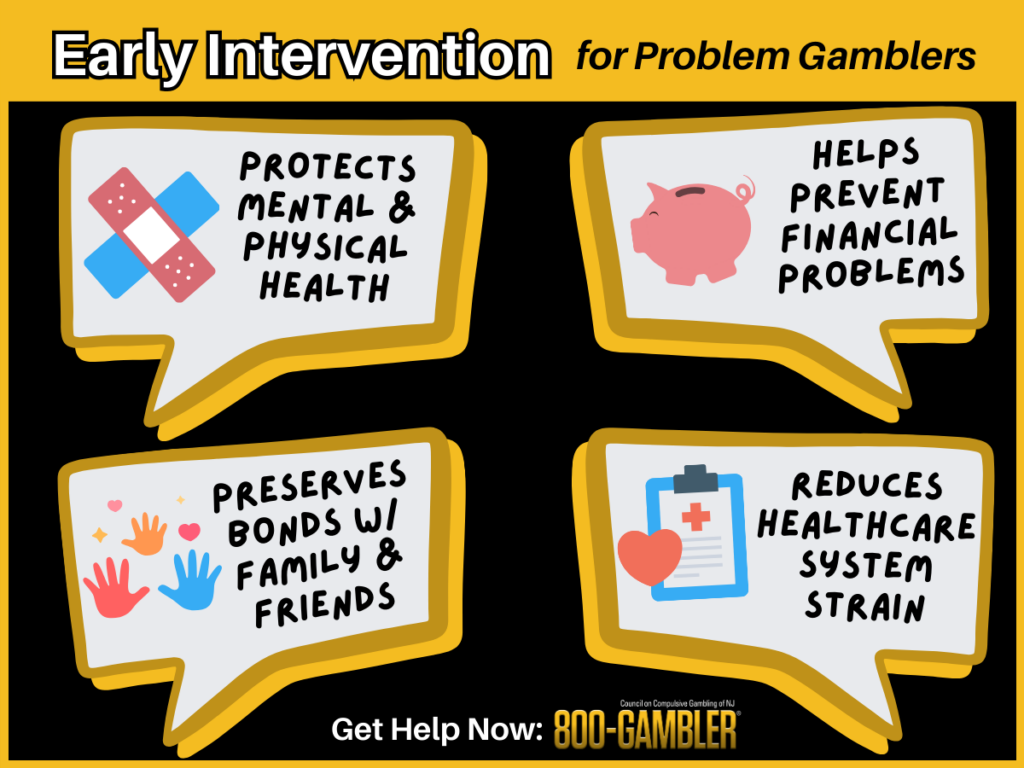Problem gambling often begins innocuously — an occasional game, a few harmless bets, all seemingly under control. However, as gambling behaviors intensify, what was once a leisure activity can morph into a serious gambling problem. This transition is subtle, often unnoticed until the effects manifest in various aspects of the individual’s life.
Early intervention plays a pivotal role in addressing this issue. The sooner we identify and address problem gambling, the higher the chances of helping individuals regain control, thereby reducing the impact on their overall well-being. Overall, early intervention is a collective effort that demands the active participation of the people affected and their families, healthcare professionals, and the broader community.
Early Intervention: A Lifesaver
Early intervention in problem gambling is like a lifeline for individuals in distress. It involves recognizing the signs of excessive gambling and offering support and treatment before the situation worsens — whether that looks like attending Gamblers Anonymous meetings, reading books on problem gambling, or seeking mental health treatment.
One effective approach in early intervention is motivational interviewing, which empowers problem gamblers to make positive changes in their lives. This counseling technique helps individuals recognize their problematic behaviors and motivates them to change. It is a collaborative, goal-oriented style of communication that focuses on improving the individual’s self-efficacy.
Another early intervention approach that some problem gamblers find useful is cognitive-behavioral therapy (CBT). CBT is a form of psychological treatment that has been demonstrated to be effective for a range of problems, including problem gambling. It operates on the idea that our thoughts and perceptions greatly influence our behaviors. In the context of problem gambling, CBT could involve challenging the belief that one is due for a big win or that gambling is the only way to cope with stress.
This approach also equips individuals with practical skills to manage their gambling urges. Techniques such as self-monitoring, goal setting, and coping strategies are crucial to this process. Self-monitoring helps individuals keep track of their gambling behaviors and identify triggers. Goal setting provides a clear path towards controlled gambling or, in some cases, complete abstinence. Coping strategies, on the other hand, offer healthier alternatives to deal with stress or boredom, which are often triggers for gambling.
Benefits of Early Intervention

Protecting Mental & Physical Health
The stress and anxiety associated with problem gambling can take a toll on mental and physical health. By addressing the issue early, we can prevent these adverse health effects.
Restoring Financial Stability
Early intervention can help alert problem gamblers to the potentially devastating financial consequences of their behavior, helping them regain financial stability.
Strengthening Relationships
Excessive gambling can strain relationships with family and friends. Early intervention can repair and strengthen these vital connections.
Reducing the Burden on Health Care
Problem gambling can lead to increased utilization of healthcare resources. Early intervention helps alleviate this burden, benefiting both individuals and the healthcare system.
Early Intervention Is Effective!
Early intervention is paramount when it comes to problem gambling, whether it manifests as courtsiding or an unchecked sports betting problem. By recognizing the signs and seeking support early on, problem gamblers can preserve their mental and physical health, financial stability, and relationships. Furthermore, early intervention can lessen the burden on our healthcare system, ensuring that resources are allocated more efficiently.
If you or someone you know is struggling with problem gambling, don’t hesitate to reach out to 800-GAMBLER. Our toll-free, confidential helpline operates 24/7, and we’re here to provide the support and guidance you need to overcome gambling challenges. Don’t let problem gambling control your future. Take the first step towards recovery today!



